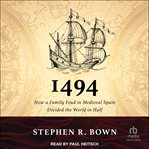Nonfiction
eAudiobook
Details
PUBLISHED
Made available through hoopla
EDITION
DESCRIPTION
1 online resource (1 audio file (10hr., 12 min.)) : digital
ISBN/ISSN
LANGUAGE
NOTES
Read by Paul Heitsch
When Columbus triumphantly returned from America to Spain in 1493, his discoveries inflamed an already-smoldering conflict between Spain's renowned monarchs, Ferdinand and Isabella, and Portugal's João II. Which nation was to control the world's oceans? To quell the argument, Pope Alexander VI issued a proclamation laying the foundation for the Treaty of Tordesillas of 1494, an edict that created an imaginary line in the Atlantic Ocean dividing the entire known (and unknown) world between Spain and Portugal. Just as the world's oceans were about to be opened by Columbus's epochal voyage, the treaty sought to limit the seas to these two favored Catholic nations. The edict was to have a profound influence on world history: it propelled Spain and Portugal to superpower status, steered many other European nations on a collision course, and became the central grievance in two centuries of international espionage, piracy, and warfare. The treaty also began the fight for "the freedom of the seas"-the epic struggle to determine whether the world's oceans, and thus global commerce, would be controlled by the decree of an autocrat or be open to the ships of any nation-a distinctly modern notion, championed in the early seventeenth century by the Dutch legal theorist Hugo Grotius, whose arguments became the foundation of international law
Mode of access: World Wide Web







